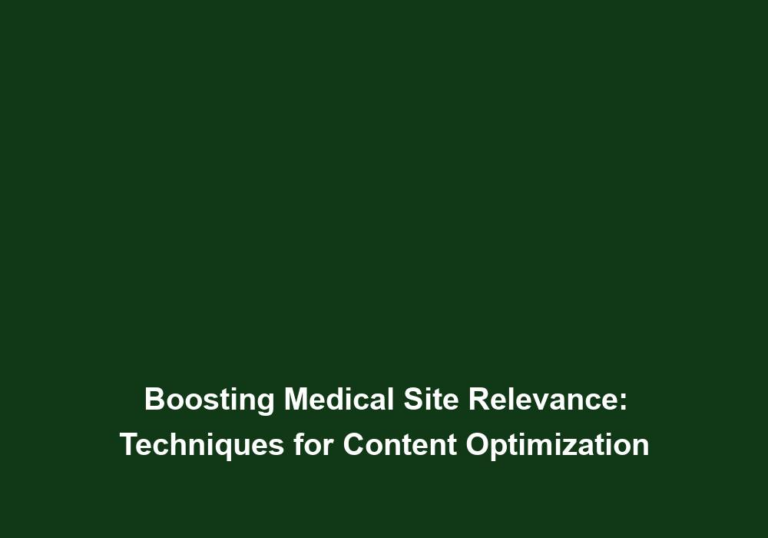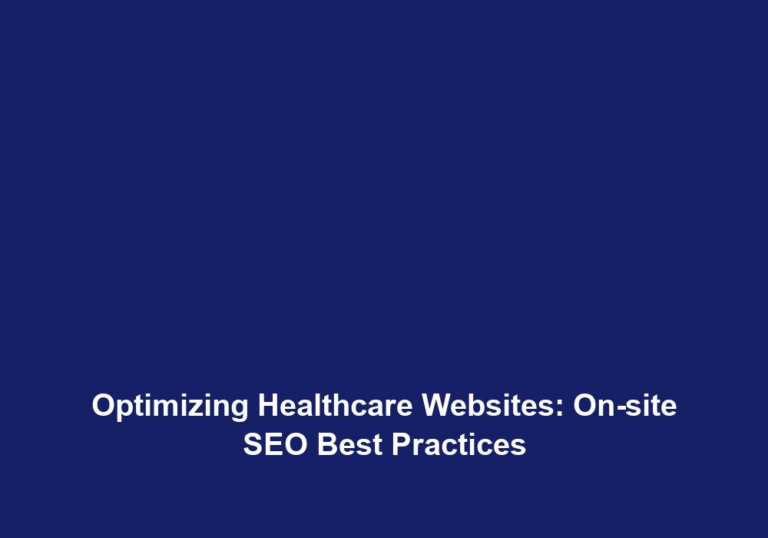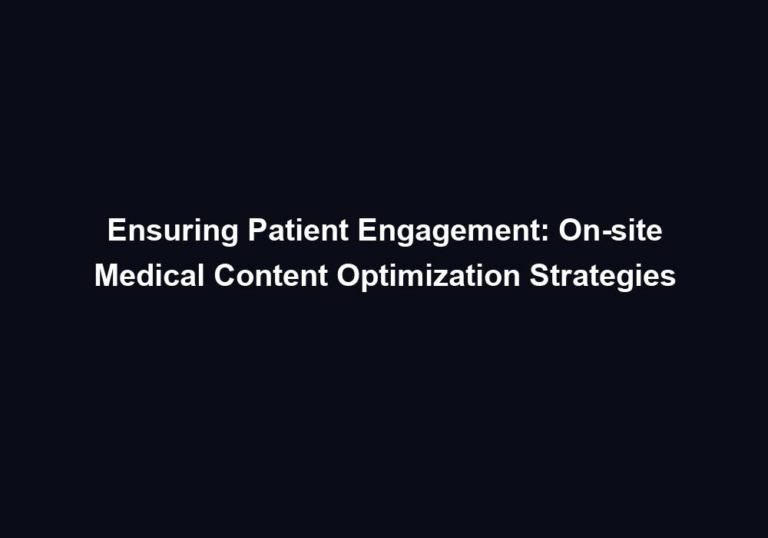Unlocking Patient Growth: Keyword Research for Healthcare SEO
In the rapidly evolving healthcare industry, having a strong online presence is crucial for the success and growth of any healthcare organization. Effective search engine optimization (SEO) strategies play a vital role in driving organic traffic to your website and reaching potential patients. One of the key elements of a successful SEO strategy is conducting thorough keyword research. By understanding the search intent of your target audience and optimizing your content accordingly, you can unlock patient growth and improve your website’s visibility in search engine results. In this article, we will explore the importance of keyword research for healthcare SEO and provide you with valuable insights on how to conduct it effectively.
Why is Keyword Research Important for Healthcare SEO?
Keyword research is the foundation of any successful SEO campaign. It involves identifying the specific words and phrases that potential patients are using when searching for healthcare information, services, or providers online. By incorporating these keywords strategically into your website content, you can increase your chances of ranking higher in search engine results pages (SERPs) and attracting qualified organic traffic.
1. Understanding User Intent
Conducting keyword research allows you to gain insight into the intent behind a user’s search query. Are they looking for general healthcare information? Are they searching for specific medical procedures or treatments? Are they seeking local healthcare providers? By understanding the intent behind these searches, you can tailor your website content to provide the information or solution the user is searching for, thus improving their overall user experience.
Moreover, understanding user intent helps you create content that aligns with the specific needs and interests of your target audience. For example, if a user is searching for information on “symptoms of diabetes,” you can create a comprehensive article that covers the symptoms, diagnosis, and treatment options for diabetes. By providing valuable and relevant content, you establish your authority in the healthcare industry and build trust with potential patients.
2. Increased Visibility and Organic Traffic
By optimizing your website for relevant keywords, you increase your chances of appearing in the top positions of search engine results. The higher your website ranks, the more visible it becomes to potential patients. Studies suggest that higher-ranking websites receive the majority of organic clicks, making keyword optimization a powerful tool for driving organic traffic to your website.
To maximize your visibility, it’s important to target both broad keywords and long-tail keywords. Broad keywords, such as “dentist,” may have high search volume but also high competition. On the other hand, long-tail keywords, like “cosmetic dentistry in New York City,” may have lower search volume but lower competition. By targeting a combination of both, you can increase your chances of ranking well for specific search queries and attracting highly relevant traffic to your website.
3. Targeted Audience Reach
Keyword research enables you to identify the specific terms and phrases your target audience is using when searching for healthcare-related topics. By incorporating these keywords into your content, you can ensure that your website appears in front of users who are actively seeking the services or information you provide. This targeted approach not only increases the likelihood of attracting qualified leads but also improves the chances of converting them into patients.
In addition to incorporating keywords into your website content, you can also optimize other elements, such as meta tags, headings, and image alt text, to further enhance your visibility in search engine results. By providing accurate and descriptive information, both search engines and users can easily understand the relevance of your content to their search queries.
How to Conduct Effective Keyword Research for Healthcare SEO?
Now that we understand the importance of keyword research, let’s delve into the step-by-step process of conducting it effectively for healthcare SEO:
Step 1: Brainstorm Relevant Topics
Start by brainstorming a list of broad topics that are relevant to your healthcare organization. Consider the services you offer, medical specialties, common health conditions, and any other topics that potential patients might search for. For example, if you’re a dental clinic, your list may include topics such as cosmetic dentistry, dental implants, teeth whitening, orthodontics, and oral hygiene.
Step 2: Expand Your List with Seed Keywords
Once you have your initial list of topics, expand it further by identifying seed keywords related to each topic. Seed keywords are short, general terms that represent the broader topic. For example, for the topic cosmetic dentistry, seed keywords could be smile makeover, veneers, dental aesthetics, teeth whitening, and dental bonding.
Step 3: Use Keyword Research Tools
To uncover more specific and long-tail keywords related to your topics, utilize keyword research tools such as Google Keyword Planner, SEMrush, or Moz Keyword Explorer. These tools allow you to enter your seed keywords and generate a comprehensive list of related keywords, along with important metrics such as search volume and competition level.
When using these tools, pay attention to search volume, competition, and keyword difficulty. Search volume indicates the average number of times a keyword is searched for in a given period, while competition refers to the number of websites competing for that keyword. Keyword difficulty, on the other hand, measures how challenging it would be to rank for a particular keyword.
Step 4: Analyze Search Volume and Competition
While selecting keywords for your content, it’s crucial to strike a balance between search volume and competition. High search volume indicates a greater number of people searching for that keyword, but it also implies higher competition from other websites targeting the same keyword. Look for keywords that have a reasonable search volume and manageable competition to maximize your chances of ranking well.
In addition to search volume and competition, consider the relevance of the keyword to your healthcare organization. Choose keywords that accurately reflect the services or information you provide and align with the needs of your target audience. By focusing on relevant keywords, you can attract highly qualified traffic to your website and increase the likelihood of conversions.
Step 5: Consider Local SEO
If your healthcare organization operates in a specific geographic area, it’s essential to incorporate local keywords into your content. Local SEO helps you target potential patients in your vicinity and improves your chances of ranking well for location-specific searches.
For example, if you’re a chiropractor in New York City, including keywords like chiropractor in NYC, back pain specialist near me, and best chiropractor in New York City can help you target local patients effectively. In addition to incorporating local keywords, consider optimizing your Google My Business listing and obtaining online reviews to further enhance your local SEO efforts.
Step 6: Analyze Competitor Keywords
Performing competitor analysis can provide valuable insights into the keywords your competitors are targeting. Identify the top-ranking websites in your niche and analyze their content to uncover relevant keywords they are utilizing. This can give you a competitive edge and help you discover keyword opportunities you may have overlooked.
Pay attention to the keywords your competitors are ranking for and consider whether you can create better, more comprehensive content around those topics. Additionally, identify any gaps or underserved areas in the market where you can focus your keyword optimization efforts. By understanding the competitive landscape, you can refine your keyword strategy and position your healthcare organization for success.
Conclusion
In today’s digital era, healthcare organizations must harness the power of SEO to unlock patient growth and thrive in a highly competitive landscape. Conducting thorough keyword research is a crucial component of any successful SEO strategy. By understanding user intent, increasing visibility, and targeting the right audience, healthcare providers can optimize their online presence and attract qualified organic traffic. By following the step-by-step process outlined in this article, you can conduct effective keyword research and position your healthcare organization for success in the digital realm.







